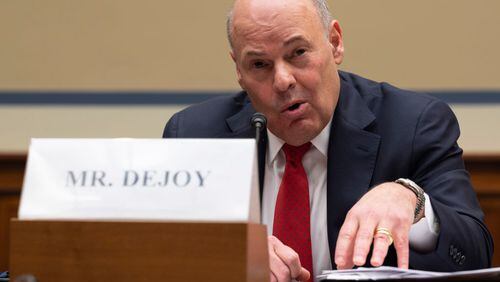YES: Higher wages mean workers spend more on life's necessities.
By Doug Gatlin
If minimum wage earners were paid a living wage, they would spend it in the local economy — a powerful economic stimulus. And the government would save money on welfare payments and other savings that would be good for the nation’s economic health.
Millions making minimum wage still need welfare, housing assistance and other government money just to survive.
The small increase of 70 cents in the minimum wage that went into effect July 24 won’t even be close to providing a wage that would allow a person to live without welfare, either from family or the church, but most often from you and me — the taxpayers.
Because the employer, who works them for his profit, doesn’t pay them enough to live on, you and I have to pitch in. And even then the person working 40 hours and overtime every week carries the stigma of “being on welfare.”
They may be among the thousands of working homeless in our state. They might work two jobs — which necessarily means any family is left alone, and probably unsupervised, during the part of the day that families ought to be together.
That’s not conducive to a strong social fabric. In all the talk about the breakdown of the family, I don’t remember much discussion about strengthening families by paying a living wage. That idea, however, should be part of the discussion.
In Atlanta, it takes around $800 a month to get a one-bedroom apartment. If you only spend one-third of your earnings on housing, which is the recommended amount, you need to make $16 an hour to afford that apartment.
A raise of the minimum wage to that amount would be tough to accomplish today, but we could shoot for just $10 an hour.
In 1968 the minimum wage was equivalent to $9.92 an hour. An 8-cent rise in your purchasing power, over a 41-year period, is really not extravagant.
Already today, more than a dozen cities have living wage ordinances with wages over $9 per hour, including Baltimore; Boston; Charlottesville, Va.; and Durham, N.C.
The businessman’s fear is that raising wages will hurt their business or put them out of business. Not so.
Paying a living wage cuts down on absenteeism, decreases employee turnover, saves on retraining costs, improves loyalty and productivity, and if other minimum-wage employers begin to pay a living wage — as would happen with a raise in the minimum wage — it would also increase sales.
More importantly, it would be the right thing to do. All major faith traditions speak about fairness in treatment of others and often specifically about fairness to workers.
Let’s try to make $10 an hour the minimum wage by the end of 2010.
To quote Dr. Martin Luther King Jr, “There is nothing but a lack of social vision to prevent us from paying an adequate wage to every American citizen whether he be a hospital worker, laundry worker, maid or day laborer. There is nothing except shortsightedness to prevent us from guaranteeing an annual minimum — and livable — income for every American family.”
Doug Gatlin is the executive director of Faith And The City, a faith-based organization representing Atlanta’s theological institutions.
NO: Already cutting jobs, some industries will cut more workers.
By Don Sabbarese
In times of recession, raising the minimum wage will lead to higher unemployment.
Ever since President Franklin Roosevelt convinced Congress to pass legislation in 1938 setting a minimum wage, the debate over whether a wage floor leads to loss of jobs has never been settled.
Last month, when the minimum wage went up to $7.25 — for the third time since 2007, increasing by more than 40 percent in two years — the debate flared up yet again.
While the new minimum is expected to lift the wages of many of the least skilled laborers and add much needed dollars to the economy, a higher minimum wage presents a set of problems at a time when many industries are facing sharp drops in demand and prices.
Complicating matters is the rise of Georgia’s unemployment rate from 4.5 percent to 10.7 percent in the last 18 months, an obvious indication that Atlanta’s labor market has transitioned from a tight market to one with tremendous excess supply.
Businesses in highly competitive industries such as fast food, restaurants and hotels, typically cut their labor costs to survive a recession; the less fortunate go out of business. These factors have contributed to one of the worst job markets Georgia has seen.
These industries are major employers of the demographic groups with the highest percent of low-wage and low-skill workers in the 16-19 age group and the subgroup of African-American teenagers, which have current unemployment levels of 24 percent and 38 percent, respectively.
The critical policy consideration is whether or not raising the minimum wage for the lowest-paid and least skilled workers can be carried out without diminishing their job opportunities.
Unfortunately, the minimum wage policy is not fine-tuned. There are transitory teenage workers in the 16-19 age group who will move on to higher wages, but there are also permanent low-wage, low-skill workers who unfortunately will not.
The permanent low-wage workers are the most exposed to the loss of jobs through labor substitution. Employers of low-wage workers must calculate whether the cost of labor at the new, higher minimum wage exceeds the hourly value of what these workers produce.
If that’s the case, then employers will have an economic incentive to either substitute that worker with a more productive worker or replace him or her with capital.
In a recession, this inexorable process will ultimately exacerbate the unemployment level for these groups. For teenage workers living at home it is not a pressing issue.
But for single mothers, it can be overwhelming, regardless of subsidies such as the earned income tax credit and food stamps. Setting a price floor for the least skilled labor markets will limit job creation in the long run, which is an unfortunate reality for these workers.
Perhaps policy-makers should consider less market-intrusive policies, such as income subsidies, as an alternative for maintaining a livable wage.
Don Sabbarese, an economist, is director of the Econometric Center at the Michael J. Coles College of Business at Kennesaw State University.





